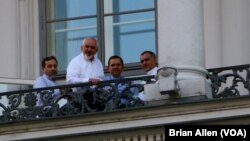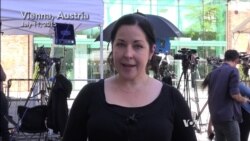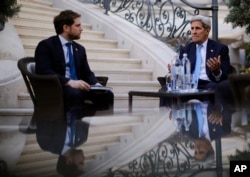Negotiators at the Iran nuclear talks plan another day of meetings Sunday, after a hectic day of closed-door meetings that lasted well into the evening Saturday at the Palais Coburg in Vienna.
U.S. Secretary of State John Kerry, hopeful that an agreement with Iran and major powers is close, said Sunday the talks are "getting to some real decisions," but there are still "a few tough things to do."
A senior Iranian official offered a similar outlook on the progression of the talks, saying "The deal is within reach today...but some issues remain that need to be resolved by foreign ministers."
With negotiations over a deal entering a third week, discussions continued until around midnight Saturday, according to the U.S. State Department. In one of the meetings, Kerry hashed out details of a potential deal with EU Foreign Minister Federica Mogherini and Iran’s Foreign Minister Mohammad Javad Zarif.
Despite repeated delays past an original June 30 deadline, Zarif shrugged and grinned from the balcony of the Coburg when asked earlier in the day by a shouting reporter if an announcement was imminent. After the talks concluded for the night, some insiders were telling reporters a deal could be announced as early as Sunday.
The P5+1 — the U.S., France, Germany, Britain, Russia and China — has extended talks multiple times in an attempt to break a deadlock on what would be a historic deal: an end to some sanctions on Tehran in exchange for a series of checks and balances on its atomic program.
Russian officials say Foreign Minister Sergei Lavrov will join the talks Sunday.
French Foreign Minister Laurent Fabius returned to Vienna to meet with his counterparts, saying in a statement Saturday, "Now that everything is on the table, the moment has come to decide."
The latest deadline extension is expected to continue through Monday.
WATCH: Heather Murdock reports from Vienna on the Iran nuclear talks
Iranian President Hassan Rouhani indicated Saturday that the talks could go either way.
"We behaved so skillfully that if talks won't succeed, the world would accept that Iran is for logic and dialogue and never left the negotiating table ... and if we succeed by the grace of God, the world will know that the Iranian nation can resolve its problems through logic," his website quoted him as saying.
On Friday, Kerry said the talks were making progress.
"We still have a couple of very difficult issues, and we’ll be sitting down to discuss those in the very near term," Kerry said to reporters as he met with his team in Vienna. "But I think we have resolved some of the things that were outstanding and we’ve made some progress."
Any agreement now faces a 60-day review by the Republican-led U.S. Congress, rather than 30, extra time that President Barack Obama's administration worries could derail it.
The sides remain divided over issues that include a U.N. arms embargo on Iran, which Western powers want to keep in place; access for inspectors to military sites in Iran; and access to Iran's nuclear scientists to determine whether Tehran conducted research in the past on how to potentially weaponize its nuclear stockpiles.
Meanwhile, Iranian Supreme Leader Ayatollah Ali Khamenei told a meeting of students in Tehran on Saturday that the U.S. is the "true embodiment of global arrogance," according to remarks posted on his website.
Khamenei was asked by a student what would happen to the "fight against global arrogance" after the completion of nuclear talks between Iran and world powers.
Khamenei's website quoted him as saying: "Fighting global arrogance is the core of our revolution and we cannot put it on hold. Get ready to continue your fight against the global arrogance. ... The U.S. is the true embodiment of the global arrogance."
The term "arrogant powers" is used in Iran to refer to the United States and its Western and Israeli allies.
Even if Khamenei wasn't signaling that the talks had failed, his comments appeared to be a blow to U.S. hopes that an agreement will lead to improved bilateral relations that could translate into increased cooperation in a common cause: the fight against Islamic radicals. Zarif hinted at just that last week, suggesting a deal acceptable to his country would open the door to joint efforts on that front.
Some information for this report came from AP and AFP. For more updates from the scene, follow VOA’s team in Vienna: Heather Murdock, Brian Allen and Victoria Macchi







